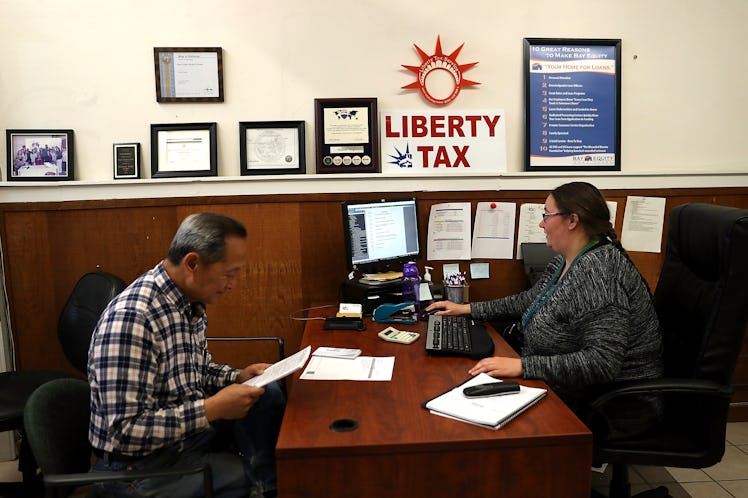
Here's What To Know If You're Wondering If You Qualify For The Earned Income Tax Credit
Raise a hand if you still have to dial your mom or dad to help you out with things you should know by now. You know — booking appointments, knowing your social security number, asking exactly how long to cook chicken... (First of all, same.) With tax season in full effect, you might especially be tempted to call your folks to ask questions such as: What is the earned income tax credit? But why bother them when you can use this guide to figure it out as the big boy or gal you are? Here's what to know about the earned income credit.
To put it in the most basic terms, it's support for low-to-moderate income working people. If you meet the requirements under the credit, it reduces the amount you owe and may give you a refund. But that's the thing — you've gotta meet the requirements. According to a statement on the Internal Revenue Service's (IRS) website, "You must have earned income from working for someone or from running or owning a business or farm and meet basic rules. And, you must either meet additional rules for workers without a qualifying child or have a child that meets all the qualifying child rules for you." There are also separate rules for members of the military, members of the clergy, and people with disabilities or who have children with disabilities.
Do you check all the boxes? You'll need the social security number for yourself, your spouse (if you have one) and any qualifying children. You'll also need to check the range of your income because, depending on what it is, you may not be applicable. If you're single and have no children, your upper limit for income to qualify is $15,270, per the IRS site.
If you don't have a qualifying child, you have to be a U.S. resident for at least a year. You also can't be claimed as a dependent or qualifying child on anyone else's return and you must have been at least 25 years old by the end of the tax year. Oh, and you cannot — I repeat, you cannot — claim the credit if your filing status is "married but filing separately." Phew. Got all that? If not, the guidance on the IRS' website should be a real help.
The deadline to file taxes is creeping closer, so might want to try getting yours submitted as soon as you can. This year, Uncle Sam wants your taxes no later than April 15, and if you don't pay up on time, you might be hit with a failure-to-file penalty. The penalty deducts a minimum of five percent of what you might owe, and up to a 25 percent maximum of what you owe. Oof. If you still haven't filed your taxes more than 60 days after the April 15 deadline, the charges will either increase to a $135 fee or 100 percent of the taxes you owe, according to Yahoo. So you really want to make sure you get yours squared away.
If you can't, you can submit a Form 4868: Application for Automatic Extension of Time To File, which will give you an extra six months to get your taxes submitted as long as it's postmarked on or before April 15. It's really a lifeline for anyone who might not have the funds they owe, or had some other circumstance that got in their way of getting this done.
With all these steps, you still might be tempted to call your parents for help, but something tells me that you've got this under control. Good luck!